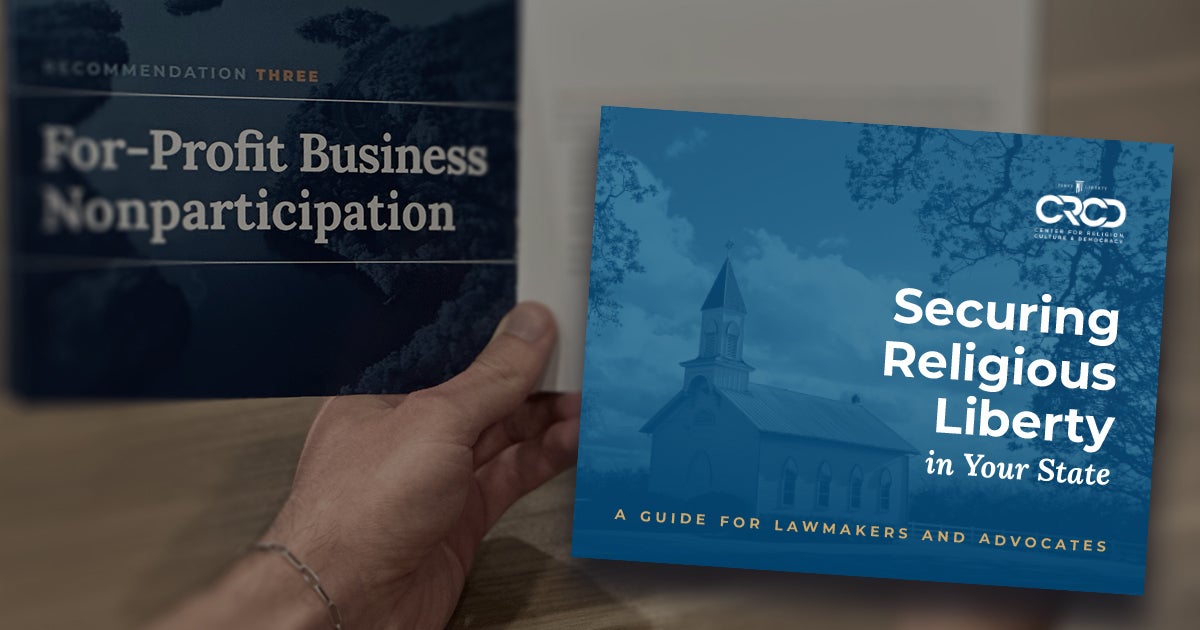
Dan Gilmore – 4 minutes
First Liberty’s Center for Religion, Culture & Democracy recently released the results of the 2024 Religious Liberty in States Index, which ranks states based on how well they protect religious freedom. Regardless of ranking, each state has its strengths, weaknesses and areas for improvement. In this article, we’ve broken down five ways you can help improve your state’s religious freedom ranking.
Keep in mind, some of these recommendations have already been implemented in many states. You can click here to check how your state ranks and what legal protections are already in place. Whether you’re an activist, legislator, or an American citizen, we encourage you to advocate for one or more of these protections if your state lacks them.
1. Enacting a Religious Freedom Restoration Act
As of 2023, 25 states have a Religious Freedom Restoration Act (RFRA) in place. These laws are modeled after the federal Religious Freedom Restoration Act that Congress enacted in 1993 to ensure robust protection of religious liberty.
These laws offer the broadest possible protection of religious freedom. These laws generally state that the government must accommodate religious practices when it can. They also give citizens their day in court when they believe the federal government has violated their rights.
Adopting a RFRA is a great way to provide more religious freedom protections to the people in a specific state.
2. Passing a General Conscience Provision for Healthcare Professionals
Many states have laws that ensure medical professionals serving in facilities receiving federal funding are not punished for refusing to provide services and perform procedures if they have a religious or moral objection to doing so. States that don’t have specific health care provisions can adopt a general conscience protection for healthcare workers, such as that adopted by the State of Washington.
3. Ensuring Businesses Can Operate Consistent with Their Faith
In recent years, many American business owners have faced lawsuits because of their religious objections to participating in or endorsing same-sex weddings, such as First Liberty clients Aaron and Melissa Klein.
Mississippi offers great protection for faith-based business owners. Its statutes say that government can’t punish someone who declines to provide goods or services that violate their religious beliefs.
But Mississippi is currently the only state with this kind of explicit protection. No other state has it. You can encourage your state to adopt similar provisions.
4. Protecting Public Official’s First Amendment Rights:
People who serve in public office don’t automatically give up their religious freedom or First Amendment rights. Whenever possible, public officials should be exempted from noncore aspects of their jobs to which they have religious or moral objections.
A great example is how some states allow justices of the peace and judges to perform marriage ceremonies, but don’t make it mandatory. There have been complaints against judges, like First Liberty client Dianne Hensley, because they object to participating in same-sex ceremonies due to religious or moral reasons. However, only a handful of states have laws on the books that protect public officials in this capacity. Most states have an opportunity to offer more protections for public officials and allow them to decline participation in ceremonies or activities that conflict with their beliefs.
5. Allowing Excused Absences for Religious Holidays
Public schools are generally out of session during major religious holidays, Christmas for example. However, many minority religious holidays often get overlooked. Some states have passed laws requiring schools to provide a limited number of excused absences so that children may celebrate religious holidays. About half of all states have these provisions in place. A good example of such a statute may be found in California.
You can download this resource in full by clicking below: